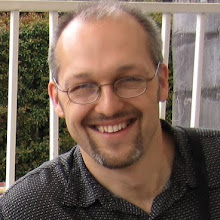How can we have any knowledge of the unseen real?
I listened to a Mars Hill Audio piece (2 cassettes) about a
fascinating guys named Michael Polyani, a world-class scientist who
switched over to philosophy of science and of politics late in his
life. The piece is called "Tacit Knowing, Truthful Knowing" or
something close.
If you want a book, I think his book "Personal Knowledge" would be
the best starting place from what I gather. His basic point is this:
Cartesian philosophy of science says that scientists follow the
"scientific method" to reach their conclusions and advance knowledge.
The scientific method requires you to be objective and dispassionate,
come up with some hypotheses, and test them, until you find out the
answers.
As a scientist he said that his experience and his observations of
other scientists were quite different! Scientists work best on
problems they are passionate about. They often reach conclusions
intuitively, before they are able to demonstrate they are right.
And he blames the demise of Europe politically in the 20th century (2
world wars, etc.) on the false worldview promoted by scientism--that
all knowledge is objective and measureable.
He interviewed dozens of skilled craftspeople, and eventually showed
that the best people in many fields use knowledge that can never be
articulated in words. It can only be passed on by close
apprenticeship and experience. He said a lot of knowledge is like
this--what he called "Tacit Knowledge," because it is impossible to
articulate.
2 common examples would be bike-riding and swimming. World-class
swimmers and cyclists may be completely unable to explain the physics
of what they're doing, but they KNOW how to cycle and swim. Heck,
even my 2-year-old son can ride his trike around, and he couldn't
begin to explain angular momentum and so forth. We know a lot of
things that we can never put into words.
Polyani argues that scientists rely heavily on tacit knowledge. And
in fact, the Mars Hill Audio folks point out, Einstein himself
repeatedly emphasized that his religious beliefs and passions took
him to his conclusions, not a strict following of the scientific
method. But scientism denies that there's any kind of knowledge
besides what is explicit, measurable, repeatable.
Since scientism or "materialism" cannot deal with issues such as
love, justice, and morality, Polyani argued that something like the
horrors of the 3rd Reich were a natural result of following this
scientific view of knowledge.
On the other hand, people who believe in "personal knowledge" can
accommodate scientific knowledge and embrace scientific progress,
since it's a legitimate kind of knowledge, though it's limited.
So learning about the unseen real is learning about things which may
never be able to be measured or even articulated. They may not even
be repeatable. But that won't make them any less real or true. (Love
is like that, isn't it?)

No comments:
Post a Comment